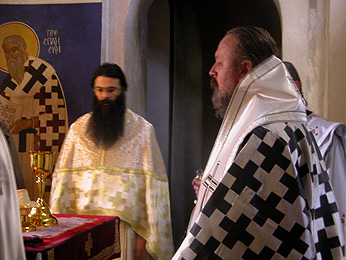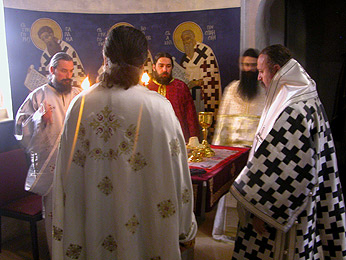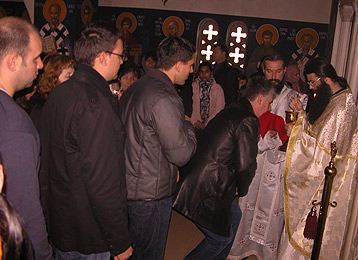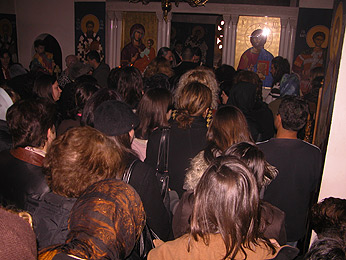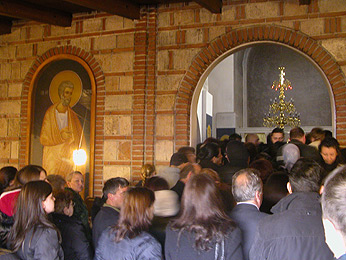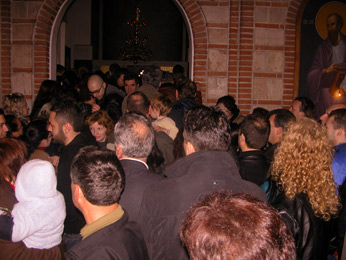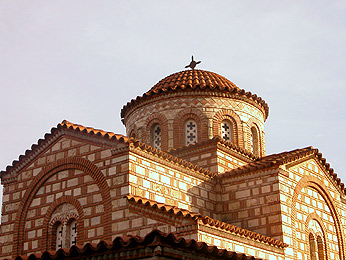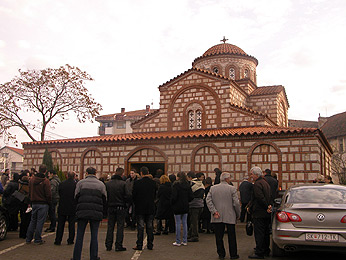Christ is born! ( 07.01.2010 )
The Nativity of Christ
“He Who is seated in the heaven of heavens, in the east of His glory and light, is glorified (today) in the west of our poverty and nothingness; and the Son of God accepted to become and be named the Son of Man” (Saint Gregory the Theologian).
What concerns God’s nature cannot be the subject of scientific research. What kind of god would he be who could be subject to empirical research and about whom science could prove whether he existed? None! When the existence of God could be scientifically proven, then man’s freedom of choice between good and evil would be much violated. God’s gift of freedom is a fundamental property and irreplaceable value of man’s person, created by the image and likeness of God.
What is related to some of God’s works and interventions in man’s history can be subject to scientific research, too, for instance archaeological research, yet it can develop only in the direction of proving the Biblical records, not in the direction of their denial. In any case, to us in the Church the following rule applies: if some truth that the Godman Christ does not exist could be even scientifically proven, I would rather stay with Christ than with that truth.
What is related to God’s manifestations and energies can be realized only through personal experience. Therefore, in the Church there is no external, scientific criterion of knowing the truth—Christ, there is rather an internal, ascetical-hesychastic and sacramental criterion, through which we know personally and out of experience Christ the True God. When a man, through ascetical and prayerful struggle and through participation in the Holy Mysteries, has purified his heart from the passions (vainglory, avarice and pleasure-indulgence), then he will discover within him the Kingdom of Heaven, i.e. the grace of God, which we receive through the Holy Mystery of Baptism. Divine grace transforms our entire spiritual life and existence: the usual daily prayer acquires another quality—it becomes mind-and-heart prayer, the mind illumines, and the internal warfare with the demonic passions considerably weakens. If the process of transformation reaches the stage of deification of both body and soul, then the man, according to Saint Gregory Palamas, will be able to see with his transformed physical eyes the uncreated divine energy as light that to all created accordingly gives existence, life and rationality, i.e. as uncreated light that gives man being, well-being, and eternal well-being.
Hence, all has been said in the Holy Gospel, we must only turn the Gospel words into personal deeds. As the Holy Fathers say, God is hidden in His commandments, and he who fulfills them will come to know Him.
Children, today is the Nativity of Christ. The One Uncreated, born before all ages, without passion, incorporeally, in a way beyond reason, by God the Father, is born today in the flesh by our Lady the Theotokos and Evervirgin Mary, in Bethlehem of Judea. The Uncontainable, in Whose bosom rests all that is created, today, contained within a body, rests at His All-Holy Mother’s bosom. Not through a change of place, since He is omnipresent, but through divine condescension, for He alone loves mankind, He came to take and offer us to the Father and grant us the dignity of seating at His right hand. Remaining a perfect God, the Only-begotten Son of God became without change a Perfect Man as well and thus identifying Himself with each one of us, He loaded upon Himself all our sorrow, darkness, pains, afflictions, loneliness, hopelessness and death. The Son of God became a man and allowed us to become gods by grace.
His whole life among us, earthborn, was a humble and ineffable suffering, whose dimensions will to us, created that we are, remain unfathomable forever. He came as a Godman, rendering us personal owners and partakers of the fruits of the, for us, salvific communion of the properties of the Divine and Human natures in His Hypostasis (Person). The Rich One for our sake became poor, taking the poverty of our body so that we, for our part, in His Body—the Church enrich, immensely bestowed with the divine, uncreated gifts of the Holy Spirit. He came and became man we to become gods by grace; to grow continually, gracefully and catholically, to the measure of the stature of His fullness (Ephesians 4:13). This growth for us in the Church—through the mystery of its catholic and eucharistic life—is not merely grace, deification, joy and life, love and freedom but is likewise pain, sorrow, suffering, loneliness and abandonment by all people. In fact, in this age and life it is wondrous, needed and sacred intertwining or antinomy of these opposites.
The God-Child born today came and granted us in the person of our least, most sinful brother to love and recognize Him, the meeting with our fellowman to be a test of the authenticity of our life in Him. By God the Father sent Son of God granted us in the Church—that uncreated-created icon of the Holy Trinity—and through its Holy Eucharist, to transform our existence, shaping our personal relationships in the likeness of that Trinitarian “as.” “That they all may be one, as You, Father, are in Me, and I in You; that they also may be one in Us, that the world may believe that You sent Me” (John 17:21). Thus loving one another, let us be living and radiant icons of Theophany, eternal witnesses to the Trinitarian graceful dispensation of salvation, revealed in the Person of the Godman Christ, in His risen Body—the Church and Logos-like heralds of the joyful tidings that Christ God is born!
Children, at every Holy Liturgy of the Church we celebrate every moment of Christ’s life. Christ’s Incarnation, Christ’s Nativity, Christ’s mission, Christ’s Passion, Christ’s burial, Christ’s Resurrection, Christ’s Ascension, Christ’s seating at the right hand of God the Father and the Holy Pentecost i.e. the fulfillment of the promise about the Spirit. This does not mean that Christ’s Dispensation of our salvation repeats at every Liturgy, but it means that we, who participate in the liturgical time and space of the ecclesial Eucharist (Sacrifice of thanksgiving), are given again and again the opportunity to participate gracefully and really in the entire life of Christ, partaking of Him. This is the way in which in
Personally, spiritually and internally, we can truly celebrate the Nativity of Christ only if with our mind we find the entry to our heart’s interior, the entry to the cave where Christ lies in a manger, and only if we worship the Godchild Christ there and offer Him our gifts. All until we reach this internal spiritual development of ours, all until then, I say, we will still celebrate the Nativity of Christ only on its margins.
Our life and existence are a gift from our Heavenly Father. How do we thank Him for all He has done for us? The Holy Gospel says: “You shall love the Lord your God with all your heart, with all your soul, and with all your mind and reason, and with all your strength” (cf. Matthew 22:37, Luke 10:27). We must all devote our life and existence to God and to His glory, just as He has dedicated His life to us and to our glorification. Each one of us will do that according to his strength and his love, so that some will bring forth thirty, others sixty, and yet others a hundredfold fruit. We must bear witness with our whole life to the wondrous miracle that we have become gods by grace. Most Holy Theotokos, help us and save us!
Christ is born!
Metropolitan Nahum of Strumica
